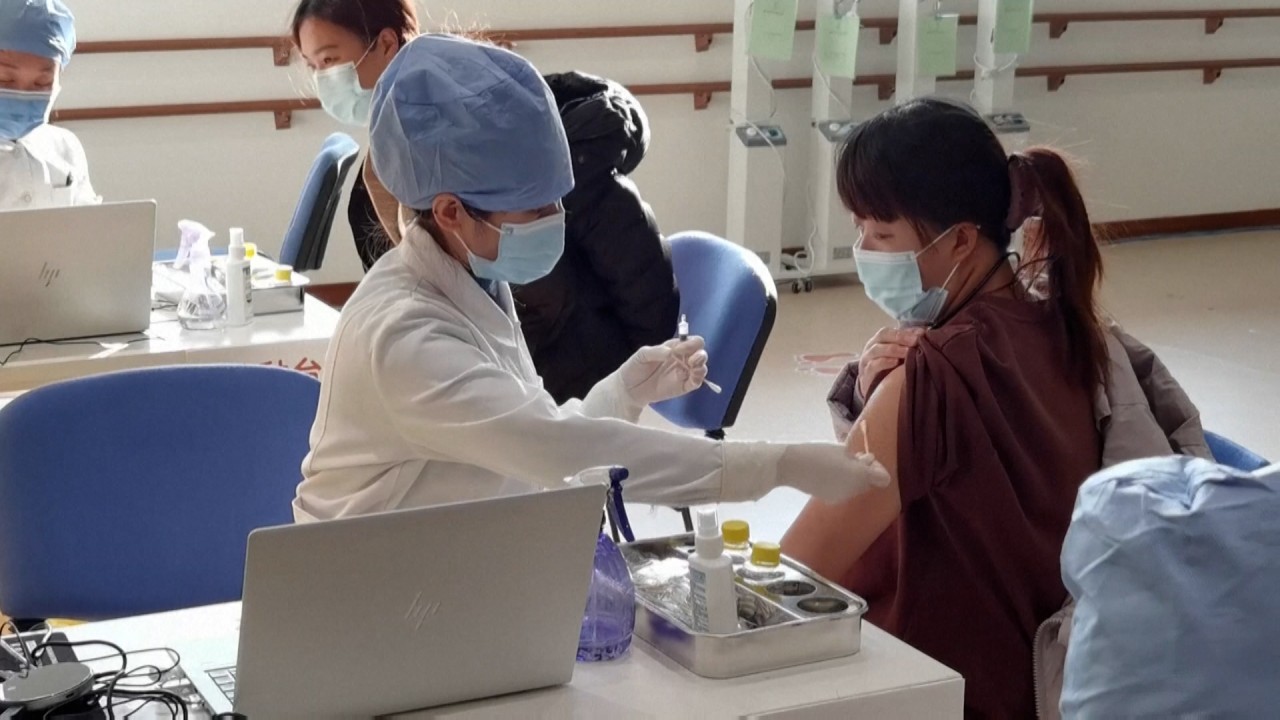
Coronavirus: Chinese urged not to make ‘unnecessary’ trips home for Lunar New Year
- Local authorities want residents to avoid the annual holiday travel rush to prevent the spread of the virus
- It comes as northern Hebei province is grappling with the country’s biggest spike in infections in recent months
The country sees the world’s largest annual human migration in the lead-up to the Lunar New Year – which falls on February 12 this year – as people travel home for family reunions.
China’s railway network had been expecting some 407 million train journeys to be taken from January 28 to March 8 during what is known as chunyun, or the Spring Festival travel rush.
That was the estimate given last week by Zhu Wenzhong, deputy director of China State Railway Group’s passenger transport department. He said that would be a 93 per cent jump from last year, when the festive season was disrupted by the virus outbreak in Wuhan, but about the same as 2019.
Coronavirus: Chinese embassy in US urges citizens to only travel if necessary
China’s cabinet has also urged employers to be flexible about this year’s Lunar New Year break. “In a bid to prevent transmission and control the pandemic, we encourage companies and enterprises to make flexible arrangements for the holiday and guide employees to spend the vacation in the area where they work,” the State Council said in a notice last week.
However, top epidemiologist Zhong Nanshan said there was no need to restrict travel within China, though he said overseas trips and medium- to high-risk areas should be avoided. He told state broadcaster CCTV last week that people should continue to take precautions such as wearing masks.
Zeng Guang, another leading epidemiologist, also said domestic travel should not be suspended, noting that the virus had been kept under control during other Chinese festivals in recent months.

China has seen sporadic outbreaks of the virus this winter, with locally transmitted cases reported in Beijing and several northeastern cities. There were 104 local infections reported around the nation last month, up 76 per cent from November, according to official figures.
In response to the winter outbreaks, more than 10 local governments – including Beijing, Shanghai, Hebei and Shandong – have launched campaigns this week telling people “not to make unnecessary trips to return home”.
In Shanxi, the Taiyuan municipal government has called for anyone planning a trip to report to their local community beforehand. The governments of Suzhou in Anhui and Qian county in Shaanxi, meanwhile, will only allow people to enter if they provide a negative Covid-19 test result.

03:07
China plans to vaccinate 50 million people before the Lunar New Year holiday
The moves have made many Chinese think twice about their holiday plans, according to an online poll by Banyuetan, a magazine under state news agency Xinhua. The 15,100 people surveyed were almost equally split on the three options for the holiday: hurry back home; wait and see; or stay put.
Shenzhen-based programmer Liang Zhibo is in the “wait and see” camp. He had planned to book a flight home to Shenyang, Liaoning, until the northeastern city had a Covid-19 outbreak late last month and mass testing was rolled out for its 7 million residents.
Liang said his plan was on hold for now, and he hoped the situation would improve.
“I really want to go back, and most people I know are going back,” said the 24-year-old, who has seven days off for the holiday. “But if the outbreak in Shenyang doesn’t end, I won’t be able to go because I may have to quarantine [for 14 days] when I return to Shenzhen.”
At present, Chinese authorities have designated one area a high-risk zone in Hebei, and 49 that are medium risk, including 17 in Shenyang. Most provinces have quarantine and swab test requirements for people arriving from these zones, and Shenyang has prohibited anyone from its medium-risk zones from leaving the city.

01:23
WHO 'disappointed' that China yet to grant entry to coronavirus investigation team
Xu Sen, who works in finance in Beijing, is not optimistic that he will make it home to Shijiazhuang this year. He had planned to make the 300km (186-mile) drive to his village on the outskirts of the city.
“Given the current situation, with the outbreak in Shijiazhuang just beginning, I think I probably won’t be able to go,” Xu said. “This year will be the first time … I will spend Chinese New Year without my family.”
Zhao Pengfei, a migrant worker from Henan province, did not want to put his wife at risk because she is pregnant. They plan to stay in Beijing for the holiday.
“In my case, it’s wise to stay,” Zhou said. “If my wife wasn’t pregnant, we would definitely go back to our hometown to spend time with our parents and grandparents.”
He said other migrant workers were planning to go home to see their children and parents.
“After making a living away from home for a year, it’s important for us to spend the Spring Festival with our families,” he said.
That sentiment was echoed by Zheng Wen, who owns a cement factory in Suzhou, Jiangsu province. He said the decision was up to his workers. “They can either leave or stay for the Spring Festival – we have flexible arrangements. It’s hard to find experienced workers, so we’ve had flexible arrangements for years,” he said. “We can’t force them to stay – it’s inhumane, isn’t it? These reunions are important to most Chinese.”


